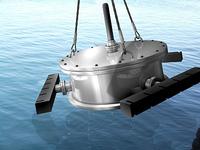-
Implant Sciences sells $200,000 in explosives detectors to Mexican government
Last week Implant Sciences announced that it had received an order for more than $200,000 worth of its portable explosives detectors from the Mexican government
-
-
Twelve Chinese hacker groups responsible for attacks on U.S.

U.S. cybersecurity experts say as few as twelve different Chinese hacker collectives, working at the behest of the government, are responsible for the majority of cyberattacks on U.S. businesses and government agencies; the bulk of the attacks are stealthy in nature and have resulted in the loss of billions of dollars’ worth of intellectual property and state secrets from the private and public sector
-
-
The north of England can become the world’s nuclear base
Despite the repercussions from Fukushima, the nuclear new-construction renaissance continues in countries such as China, India, and the United Kingdom with sixty reactors under construction, 155 planned, and a further 338 proposed’ a new study suggests the that the north of England can become a hub for nuclear power-related activities
-
-
U.K. approves new reactor designs

U.K. regulators have given interim approval to two new nuclear reactor designs — the EDF and Areva’s UK EPRTM and Westinghouse’s AP1000; the regulators say that there are still some issues to be addressed, and that neither reactor can be built in the United Kingdom until these issues are resolved
-
-
Spending cuts force contractors to alter strategy
Projected federal spending cuts are upsetting the status quo in the world of government contracting, forcing firms to reevaluate their business strategies or determine whether they can do business at all
-
-
Scarce minerals, metals threaten manufacturing
The growing scarcity of certain minerals and metals is leading to explosive prices and delivery delays; since the relationships among these resources are strong, both the causes of and the solutions to scarcity are complex; for a manufacturing organization with a global supply chain, this can spell trouble
-
-
Innovative molecular detection system spots foodborne pathogens
3M introduced the 3M Molecular Detection System, a method of detecting dangerous pathogens like Salmonella, E. coli O157, and Listeria, that can shut down businesses and threaten public health
-
-
Companies urged to limit sale of surveillance tech to repressive regimes
The European Commission is urging private companies to limit the sale of surveillance technology to foreign countries that “repress” their people
-
-
Shell fears cyberattack on oil infrastructure
Oil executives fear that a cyberattack on critical infrastructure could wreak havoc by destroying facilities or disrupting production
-
-
DSIT in $12.3 million order for underwater security systems

DSIT Solutions receives its largest order ever for underwater security systems; the contract calls for the delivery of a large number of AquaShield Diver Detection Sonar (DDS) and PointShield Portable Diver Detection Sonar (PDDS) systems to protect offshore oil platforms, coastal energy terminals, and high value vessels against underwater intrusion and sabotage
-
-
Right degree helps grads compete in DHS hiring boom
Even amid the economic downturn, students who graduate with degrees in homeland security can breathe a bit easier knowing that they are more likely to find jobs than their fellow graduates; the agency’s hiring boom is expected to continue over the next several years as more and more baby boomers in their 50s begin to retire
-
-
Senate stalls on easing visa restrictions for highly skilled immigrants
A bill meant to allow more high-skill immigrants from India and China to obtain green cards has been placed on hold by Senator Charles Grassley (R-Iowa) over concerns that it should do more to “protect Americans at home”
-
-
Court rules in favor of American Airlines in $30 million dispute with TSA

On Tuesday a U.S. Court of Appeals ruled against DHS ordering the agency to review its decision to deny reimbursing American Airlines $30 million for the additional security procedures it had been asked to put in place by the Transportation Security Administration (TSA) following the 9/11 attacks
-
-
U.S. 2011 billion-dollar disasters
The National Oceanic and Atmospheric Administration (NOAA) has recalculated the number of weather disasters in the United States which passed the billion dollar mark; NOAA added two disasters, pushing the 2011 tally to twelve billion-dollars-or-more disasters; these disasters caused more than 1,000 deaths and inflicted damaged estimated at $52 billion
-
-
Iridium offers emergency response service on satellite phone
Iridium offers free SOS service on its Iridium Extreme satellite phone; individuals who need emergency help can now maintain contact with an operator during the emergency rather than rely on one-way SOS alerting
-
More headlines
The long view
Ransomware Attacks: Death Threats, Endangered Patients and Millions of Dollars in Damages
A ransomware attack on Change Healthcare, a company that processes 15 billion health care transactions annually and deals with 1 in 3 patient records in the United States, is continuing to cause massive disruptions nearly three weeks later. The incident, which started on February 21, has been called the “most significant cyberattack on the U.S. health care system” by the American Hospital Association. It is just the latest example of an increasing trend.
Chinese Government Hackers Targeted Critics of China, U.S. Businesses and Politicians
An indictment was unsealed Monday charging seven nationals of the People’s Republic of China (PRC) with conspiracy to commit computer intrusions and conspiracy to commit wire fraud for their involvement in a PRC-based hacking group that spent approximately 14 years targeting U.S. and foreign critics, businesses, and political officials in furtherance of the PRC’s economic espionage and foreign intelligence objectives.
European Arms Imports Nearly Double, U.S. and French Exports Rise, and Russian Exports Fall Sharply
States in Europe almost doubled their imports of major arms (+94 per cent) between 2014–18 and 2019–23. The United States increased its arms exports by 17 per cent between 2014–18 and 2019–23, while Russia’s arms exports halved. Russia was for the first time the third largest arms exporter, falling just behind France.
LNG Exports Have Had No Impact on Domestic Energy Costs: Analysis
U.S. liquified natural gas (LNG) exports have not had any sustained and significant direct impact on U.S. natural gas prices and have, in fact, spurred production and productivity gains, which contribute to downward pressure on domestic prices.
